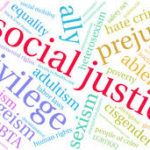“Social Justice” Is Overrunning the University of Texas

“Social justice” is an amorphous concept, increasingly invoked as a harmless synonym for “fairness,” but to progressives it is code for a radical agenda. Nobel Prize-winning economist Friedrich Hayek exposed this agenda decades ago, in a volume of his trilogy Law, Legislation and Liberty entitled “The Mirage of Social Justice.” Unfortunately, the leftists running higher education have used “social justice” as a Trojan Horse with which to infiltrate academic curricula with socialist indoctrination. My alma mater, the University of Texas, is sadly not immune from this trend. I explore the degree to which “social justice” has been embraced at UT in a post for the James G. Martin Center for Academic Renewal. The piece was featured in National Review Online and Michael Shaughnessy’s column in Education Views. And in The College Fix. And in Real Clear Education. And in Overlawyered.com. And in Accuracy in Academia.

A somewhat different version of the essay appears here, with more detail about what “social justice” means and why it is bad.
Proponents of higher education reform have criticized the rising tuition, bloated administrative bureaucracies, dumbed-down curricula, mortgage-sized student loan balances, and summer camp-like perks—such as climbing walls and even lazy rivers–that characterize many colleges and universities today. More substantive critiques have focused on declining academic outcomes and the degree of political bias and indoctrination routinely incorporated into academic programs, especially in the guise of promoting “diversity and inclusion.” The latest racket in higher education, evident at my alma mater, the University of Texas at Austin, is the disturbing proliferation of “social justice” as a degree program, course topic, academic emphasis, and even as a prerequisite in campus job descriptions.
“Social justice” is an ideal vehicle for the Left: It is a seemingly innocuous term with no established definition, which, like a Rorschach test, is susceptible of numerous different interpretations. Many members of the general public, perhaps vaguely recalling the origins of the term in nineteenth century Jesuit theology, construe it as a harmless synonym for “fairness.” But to progressives—who dominate the academy these days—“social justice” is a colloquial expression with a specific meaning: economic equity (the redistribution of wealth), “sustainability” (a pre-industrial environmental ethos), and the elimination of racial disparities throughout society (all statistical imbalances among racial groups representing, in the Left’s view, systemic discrimination and institutional racism).
To progressives, “social justice” is a utopian goal thought to require universal access to health care, a living wage, free college tuition, renewable energy mandates and “green” environmental policies, multiculturalism, racial quotas, and much more. The term is malleable enough to be extended to service the various constituencies of the Left, such as the LGBT community, illegal immigrants, “sex workers,” debtors, victims of sexual assault, and prisoners. “Social justice” therefore represents a veritable cornucopia of progressive policy outcomes—an all-purpose euphemism for the Left’s ideological platform. Thus, the term is more than a banal cliché; it is a highly-loaded prescription for radical economic, political, and social change. As Jonah Goldberg has remarked, “Social justice is code for good things no one needs to argue for and no one dare be against.”
Savvy globalists have long used “social justice” as shorthand for socialism, which explains its inclusion in the Soviet-era 1976 Cuban Constitution and popularity among United Nations apparatchiks. A 2006 UN report [Social Justice in an Open World] acknowledges that “the notion of social justice is relatively new. None of history’s great philosophers—not Plato or Aristotle, or Confucius or Averroes, or even Rousseau or Kant—saw the need to consider justice or the redress of injustices from a social perspective.” Indeed, the UN report acknowledges that the notion of social justice is alien to the American founding: it “is a concept rooted very tenuously in the Anglo-Saxon political culture.” Instead, the UN report concedes,
The concept first surfaced in Western thought and political language in the wake of the industrial revolution and the parallel development of the socialist doctrine. It emerged as an expression of protest against what was perceived as the capitalist exploitation of labour and as a focal point for the development of measures to improve the human condition. It was born as a revolutionary slogan embodying the ideals of progress and fraternity.
In a society such as ours, committed to the principles of private property, free-market economics, individual liberty, and equality before the law, the social-justice agenda is highly controversial and ought to be the subject of an extended intellectual debate before its amorphous precepts are embraced as policy nostrums. Yet the question-begging term (its proponents never actually explain which policies are “socially just,” and why) is assumed to be self-evidently true, and its proponents dispense with justifying their positions, instead proceeding directly to implementation. This amounts to indoctrination and activism—not “education”—and explains why some critics derisively label progressive colleges and universities as “social justice academies.”
Nobel Prize-winning economist Friedrich Hayek believed that the concept of “social justice” is a pernicious threat to individual freedom and in 1976 devoted an entire volume of his trilogy Law, Legislation and Liberty to debunking it as a “mirage.” Because the goal of “social justice” is often asserted as an excuse for government intervention to overturn the spontaneous and uncoerced ordering of the free market, Hayek pungently declared the term to be “fraudulent” and a “hollow incantation” that people should be “ashamed” to use.
“Justice,” Hayek explained, is a well-defined concept in law, generally understood to be a system of rules governing individual conduct, and constraining state action. Applying the concept out-of-context to the collective operation of society as a whole completely alters—indeed, in Orwellian fashion, reverses—its essential meaning to compel state action. To Hayek, the ideal of “social justice” was an “incubus” representing “the gravest threat to most other values of a free civilization.” These are strong words coming from one of the world’s finest minds.
Despite Hayek’s vehement objections, the term has become so ingrained in common usage that it is now a hackneyed figure of speech, often invoked but—by design–rarely defined or debated. Yet, like a secret handshake, its latent meaning persists. In academia, masking socialist policies with a superficially-benign label is a stealth strategy for conquering from within, like a semantic Trojan Horse. Explicitly advocating the controversial policy objectives of “social justice” at a taxpayer-funded university in a conservative state like Texas would likely raise a red flag with alumni or state legislators, so the wily progressives hide behind the ostensibly-neutral phrase “social justice.” At the flagship campus of UT, and many other universities across the country, the concept has become ubiquitous.
For example, UT has a Social Justice Institute, a “central component” of the UT Community Engagement Center within the 94-person Department of Diversity and Community Engagement, headed by a former community organizer now teaching in UT’s Department of African and African Diaspora Studies. The Institute hosts monthly programs (the Social Justice Conversation Series) on topics related to social justice and diversity. The Institute’s website maintains a “social justice directory” of faculty members “whose current research and teaching priorities intersect with social justice concerns, activist scholarship and/or community collaborations.” The Institute also features profiles of “activist-scholars of the month” from various UT departments.
Some of UT’s academic departments, such as the College of Education and the English Department, have initiated their own social justice programs. Recognizing “a history of oppression, inequity, and structural discrimination in the university, local, state, and national context,” the College of Education has formed a Social Justice, Equity, Diversity, and Inclusion Committee to effectuate the mission of leveraging “diversity and interdisciplinarity as critical components in our innovative research, inclusive and empowering curricula, and professional leadership.” The English Department has a Literature, Social Justice, and Community Service curriculum that “teaches ethical community engagement, meaningful student reflection, attention to historical and social context, the politics of literary forms, and the power of storytelling, drama, and poetry.” The projects of the LSJCS working group include fighting “food insecurity” and hunger among UT students (a cohort that, unlike many Venezuelans, appears to be well-fed).
The UT School of Architecture has established “a new program on race, gender and the American built environment. The effort aims to facilitate diversity among design and planning professionals and students, and foster innovation in teaching and research on race, gender and inequality in American cities.” Not surprisingly, the UT School of Social Work has many relevant course offerings dealing with social justice.
Aspiring social justice warriors at UT not majoring in English, Education, Architecture, or Social Work can obtain a certificate in Human Rights & Social Justice by pursuing a multi-disciplinary program drawn from the extensive catalog of social justice courses offered by UT, and working under the direction of the Human Rights and Social Justice faculty panel. Interested students can choose from a curriculum that includes classes on the Black Lives Matter Movement, the Black Power Movement, the Literature of Islamophobia, and The Roots of Social and Economic Justice.
Social justice, as code for progressive politics, has even worked itself into job descriptions at UT. For example, applicants for a Student Affairs Administrator position must demonstrate a “highly developed understanding of social justice concepts and practices.” UT’s job posting for a Healthy Masculinities Coordinator position (responsible for running the widely-ridiculed MasculinUT program) described the job as “a catalyst and resource for advancing violence prevention efforts on UT System campuses that will include a focus on gender equity and social justice,” and called for candidates with a “demonstrated commitment to diversity, social justice, innovation and collaboration.” (These are not the only examples.) Aside from being a member of Democratic Socialists of America (or voting for Bernie Sanders), how exactly does one demonstrate a “commitment” to social justice?
Colleges exist to foster critical thinking and to teach students useful knowledge germane to a legitimate academic discipline, leading to opportunities for gainful employment. Social justice does not qualify as a legitimate academic discipline—it is a slogan, or at most (in Jonah Goldberg’s words) “an ill-defined sentiment.” In academia, “social justice” is a mere pretense for ideological indoctrination and the exercise of power by the Left. Texas voters and elected officials would not countenance a “Socialism Institute” at UT, or job descriptions that decreed “conservatives need not apply.” Yet by dressing up their radical ideology as “social justice,” the left-wing activists running UT and other institutions are doing precisely the same thing, hiding in plain sight.
Taxpayers who disagree with this insidious agenda should complain to their elected officials, and to the governing boards of state-funded universities. Objecting alumni should also withhold financial support to their alma maters. The fringe element running state universities succeed because the majority, through inattention and inaction, let them. Silence constitutes assent.
In Texas, some suggested contacts are:
Gov. Greg Abbott: @GovAbbott
Lt. Gov. Dan Patrick: @DanPatrickTX
The Texas Legislature (search for your representatives)
UT Chancellor: chancellor@utsystem.edu

































